Student researchers make the most of summer experience
08/17/2021

Melissa Alvisi had her dream internship in place for the Spring 2021 semester: an international studies major, she was set to work at the U.S. Embassy and Consulates in Rome, Italy.
But the internship was canceled due to COVID-19 concerns only a few weeks before her scheduled departure. Alvisi was devastated, so she sought advice from her professors. They encouraged to use the setback as motivation and consider new ways to gain experience related to her studies.
“That’s why I pursued summer research,” said Alvisi, who spent the past two-plus months analyzing a complicated topic in global affairs and economics. “I wanted to make my final year in Cortland worth it.”
Alvisi is one of nine high-achieving SUNY Cortland students who earned a summer undergraduate research fellowship in 2021. The competitive awards help students pursue full-time scholarly work with a faculty member, offering a $4,000 stipend and eight weeks of campus housing if students need it. Opportunities are guided by the university’s Undergraduate Research Council and they are open to students from all academic backgrounds.
The program returned after a one-year pause in 2020 thanks to financial support from the Cortland College Foundation and the generosity of its donors. For the first time in the program’s history, fellowships were funded by alumni and friends of the university. Some recipients conducted research in Cortland while others collaborated with faculty mentors from their hometowns.
This summer’s undergraduates represent majors such as biochemistry, geographic information systems and inclusive childhood education. Inspiration for their projects came from several sources. Some were informed by a student’s personal interests while others contributed to a faculty member’s larger ongoing work. Several topics bridge multiple disciplines.
Alvisi is pursuing a minor in economics, so her work with Associate Professor German Zarate considered China’s money lending practices in Latin American countries from 2010 to 2018. Alvisi said she enjoyed previous classes with Zarate and she was intrigued by her professor’s global knowledge. Both of them speak multiple languages — he’s a native of Peru and Alvisi grew up in Latina, Italy, approximately 40 minutes south of Rome.
Despite having a primary interest in European affairs, Alvisi was interested to learn more about Asia and South America. Her project initially focused on a Chinese global infrastructure plan, the Belt and Road Initiative (BRI), but eventually grew into something more expansive. The fellowship also offered practical, hands-on experience in writing and analyzing scholarly information.
“My initial theory was that (the BRI) could be seen as a modern Trojan horse, meaning a way for China to expand its reach across the world,” Alvisi said. “Professor Zarate kept sending me articles and got me to think: ‘Maybe that’s not it.’ So instead of looking into only the negative side of the BRI, I’m looking at the entire spectrum.”
Alvisi lived in Cortland most of the summer and carried out the vision for the fellowship by immersing herself in the work — spending many hours reading, regularly checking in with her professor on the phone or Webex, and consulting with other scholars. Her final product will be a paper that she hopes can lead to publication or travel to an academic conference.
After graduating, Alvisi wants to pursue a master’s degree in international relations and eventually work in foreign service for the U.S. Department of State.
“I could’ve been discouraged when COVID canceled the internship, but I tried to be introspective,” said Alvisi, who will serve as chief financial officer for SUNY Cortland’s Student Government Association during the upcoming academic year. “I tried to make the best of it and the research award definitely helped.”
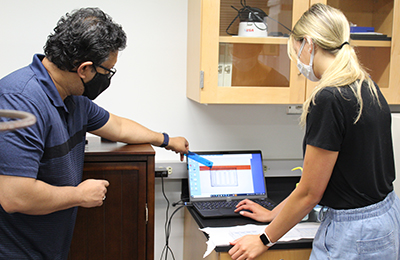 |
|
Santanu Banerjee, assistant professor of biological sciences, |
For Olivia Langdon, a biomedical sciences major, summer research provided a crucial experience that she missed during the COVID-19 pandemic: extended time in a Bowers Hall laboratory. She worked diligently on campus with Santanu Banerjee, assistant professor of biological sciences, using zebrafish to study the central nervous system.
“I was excited to get back into the lab,” said Langdon, a junior from Little Falls, N.Y. and a member of the university’s Honors Program.
Zebrafish offer a reliable model to study the central nervous system, so the research team studied them under different conditions in an effort to better understand how different types of neurons connect to each other and to other targets, including body muscles required for movement.
The purpose of Langdon’s summer research was to help determine a basis for future experiments. She performed various tasks during her full-time work in the lab — running processes to mate zebrafish, caring for larvae, operating video recording equipment and carrying out experiments from start to finish.
“I felt myself growing more independent in the lab,” said Langdon, who plans to go on to a graduate or professional program in a science-related field. “Early in the summer, it was Dr. Banerjee telling me what to do because I wasn’t as familiar, but then it became more of a discussion of what we were doing each day.”
In a long-term view, the work with zebrafish seeks to gain deeper insight into the functions of the nervous system as well as how to repair nervous system damage following spinal cord injuries or other diseases.
Banerjee said that the summer fellowship program benefits both students and faculty members because it affords a deeper learning experience compared to a traditional semester with other commitments. In addition to being a member of the Honors Program, Langdon is a member of the university’s women’s basketball team, so her free time is limited during the academic year.
“The time we have in the summer maintains the continuity between one experiment and another,” Banerjee said. “We’re able to think critically about it and read about what others have done. Those things are harder to do in a regular semester.
“Summer is the best time — uninterrupted research time.”
2021 Summer Undergraduate Research Fellowship Recipients
Learn more about SUNY Cortland’s 2021 summer undergraduate research fellows and their work through the short descriptions below.
Melissa Alvisi
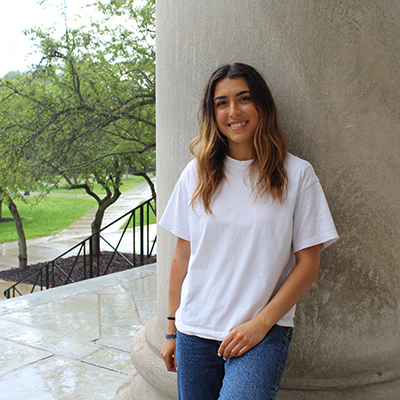
Hometown: Latina, Italy
Major: International Studies
Faculty mentor: German Zarate, associate professor, Economics Department
Fellowship donor: Nancy A. Johnson ’48
Project title: A Prospective on Chinese Loans to Latin America and the Concept of Predatory Lending
More about my research: “The research will focus on how China’s influence has gone beyond Asia, reaching areas seemingly far away from China’s geographical sphere of influence such as Latin America, to which the Asian power has been lending copious amounts of money, to the point where China has become the second-largest trade partner after the United States. Reports indicate China’s lending to Latin America has recently surpassed lending from Western institutions. Keeping in mind that Latin America is a key continent, especially for its natural resources and in view of the U.S. criticism of China engaging in predatory lending in Latin America, the research project will focus on a specific research question — whether China’s lending can be seen as predatory more than beneficial to Latin American countries.”
Future aspirations: “In terms of the research program, I would love to publish my work and take part to conferences on Latin America, specifically on Peru, Venezuela and Brazil. On a more personal level, I want to go on to graduate school for international relations/affairs and work for the U.S. State Department in foreign service.”
Marissa Baugh
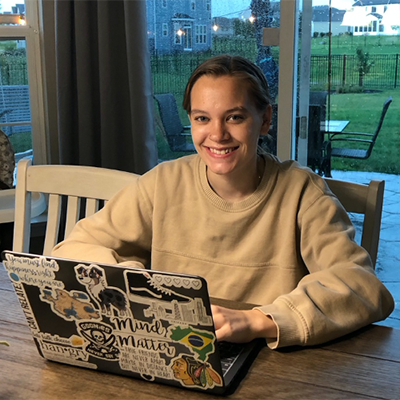
Hometown: Joliet, Ill.
Majors: Inclusive Childhood Education and Spanish
Faculty mentor: Katarina Silvestri, assistant professor, Literacy Department
Fellowship donor: Nancy A. Johnson ’48
Project title: Spanish Language Development and Perceptions of Undergraduate Students During Short-Term Study Abroad
More about my research: “The purpose of this study is to determine how SUNY Cortland students who participated in a short-term study abroad program in Cuernavaca, Mexico, perceive their experience as worthwhile in their education. This research seeks to create a better understanding of the program with respect to students’ perceptions of the experience and their Spanish language development. Also, this research provides feedback for the current program in Cuernavaca and influences future short-term study abroad programs at SUNY Cortland.”
Future aspirations: “I hope to gain teaching experience and earn my master’s degree in the field of education in the near future. Later in my career, I would like to pursue a doctorate which will allow me to continue my passion for research.”
Bettina Bonfiglio
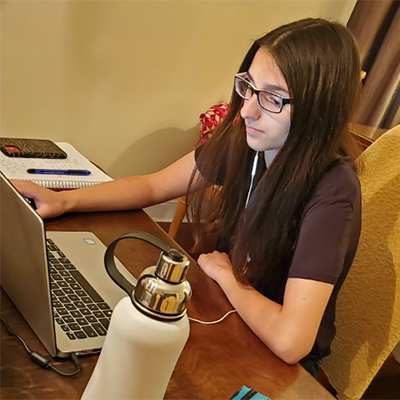
Hometown: West Sayville, N.Y.
Major: Geographic Information Systems
Faculty mentor: Christopher Badurek, associate professor, Geography Department
Fellowship donor: Daniel G. Scheffer ’96
Project title: Comparison of GIS-Based Carbon Sequestration Estimation Methods at Varying Scales in Cortland County, New York
More about my research: “My research focuses on carbon sequestration, or the absorption of carbon dioxide by trees. However, sequestration estimates are affected by both the geographic area and size. By using web and geographic information systems, or mapping, programs the effects from geographic setting and scale on estimate measures of carbon sequestration from trees can be determined. This will be done and compared for the four areas of the village of Homer, N.Y., SUNY Cortland’s campus, (Hoxie Gorge Nature Preserve at William H. Parks Family Center for Environmental and Outdoor Education) and Cortland County.”
Future aspirations: “After Cortland, I am planning on attending graduate school. I would like to expand my knowledge about geographic information systems (GIS) and all things mapping. In addition, I am not sure yet where I want to go with my studies. Not only will I use my time at graduate school to learn, but also to find out where I want to be and what I want to do with GIS.”
Allison Gurak
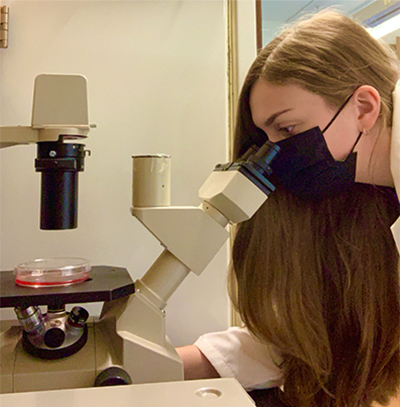
Hometown: Webster, N.Y.
Major: Biology
Faculty mentor: Christian Nelson, assistant professor, Biological Sciences Department
Fellowship donor: W. Hubert, Ph.D., and Sally Keen
Project title: Identification of Host Proteins Needed for JC Polyomavirus Infection of Glial Cells
More about my research: “JCPyV is a virus that does not cause severe sickness in healthy individuals, but immunocompromised patients suffer progressive multifocal leukoencephalopathy (PML). How JCPyV binds, enters, and infects cells is not completely understood. This research aims to determine the role of certain human host proteins involved in intracellular transport and infection of JCPyV.”
Future aspirations: “In the future, I hope to continue my education and pursue a career in virology.”
Olivia Langdon
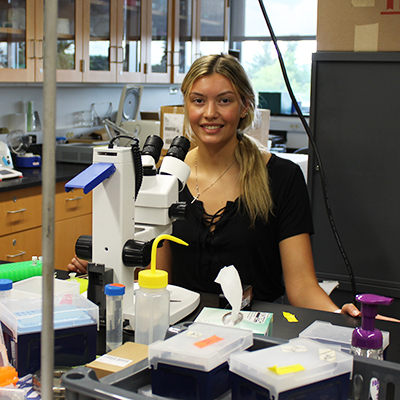
Hometown: Little Falls, N.Y.
Major: Biomedical Sciences
Faculty mentor: Santanu Banerjee, assistant professor, Biological Sciences Department
Fellowship donor: Daniel G. Scheffer ’96
Project title: Role of Glutamatergic Neurons in Locomotion Behavior of Larval Zebrafish
More about my research: “The central nervous system (CNS) controls our daily behaviors. There are connections and messages between neurons that permit this. We are trying to develop a deeper understanding of how these neuronal connections form and function by using zebrafish larvae. We’ve performed multiple experiments to analyze the larval behavior under different conditions. I hope to expand upon this during the rest of my time at Cortland, eventually using pharmacological agents and genetic mutants. This will allow a better understanding of specific CNS neurons and neurotransmitters and how their connections affect behavior.”
Future aspirations: “I want to go on to graduate school or professional school, definitely in something science-related.”
Kayla Lawrence
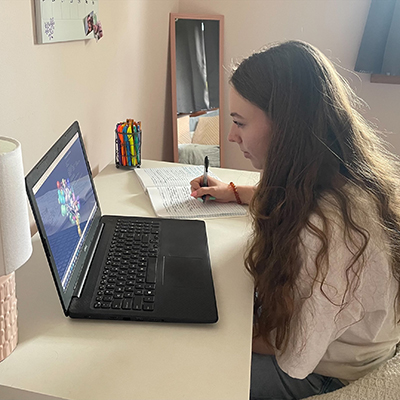
Hometown: DeRuyter, N.Y.
Major: Biochemistry
Faculty mentor: Katherine Hicks, associate professor, Chemistry Department
Fellowship donor: David F. Berger, Ph.D., Fellowship funded by Dr. Michael J. Bond ’75 and Dr. Wayne Marley ’75
Project title: Molecular Interactions Between Peptidoglycan Associated Lipoprotein and Small Molecule Targets
More about my research: “For the summer of 2020, I had planned to work at SUNY Cortland’s lab but due to COVID-19 these plans were cancelled. Fortunately, during the summer of 2020 I was able to conduct online research through a newly formed program known as MIV REU. This summer, I continued to work with MIV REU this time as a peer mentor. As a peer mentor I worked to coordinate social events among students new to the program and helped by troubleshooting problems they ran into. My research for this program involved finding potential compounds that could bind and inhibit a Peptidoglycan Associated Lipoprotein, otherwise known as PAL, which has been known to play a role in causing sepsis. This summer we worked to find out how these compounds successfully bound to PAL in attempt to find ligands to combat this protein.”
Future aspirations: “In the future I hope to graduate from SUNY Cortland and continue to go to school to become a medical doctor. Over the course of the last year working in medical-related research has inspired me to want to work closer to people in a medical environment. Through the pandemic I also have gained a greater appreciation of healthcare workers and would love to pursue a career in medicine.”
Giovanna Rossi
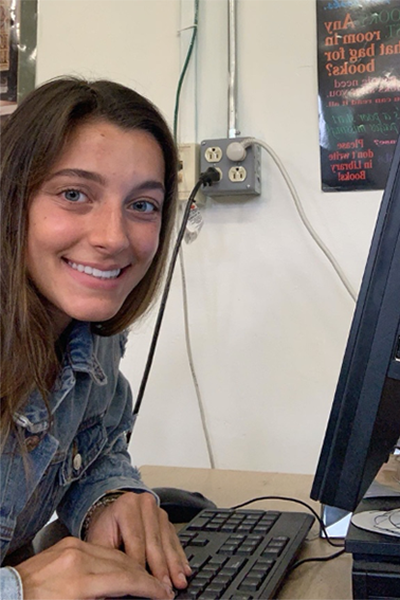
Hometown: Nichols, N.Y.
Major: Physical Education
Faculty mentor: Timothy Davis, associate professor, Physical Education Department
Fellowship donor: Sandra Laghi Cerulli ’68 and Dr. Maurice Cerulli
Project title: A Qualitative Inquiry of the Interdisciplinary Engagement of Teachers and Therapists Providing Virtual Services to Children with Disabilities
More about my research: “My specific research focused on interdisciplinary collaboration … I will be looking to determine if using the sensory-based equipment, used in Sensory Fit Families, as a bridge helped promote interdisciplinary discussions leading to a better or more effective service delivery model. I will be doing this research through virtual interviews and transcribing the data.”
Future aspirations: “I plan to earn my master’s degree in health education as part of SUNY Cortland’s 4+1 program in physical education and health education. I also am pursuing a concentration in adapted physical education. With my degree, I will pursue a career as a physical education and health teacher.”
Eleanna Julisa Ventura
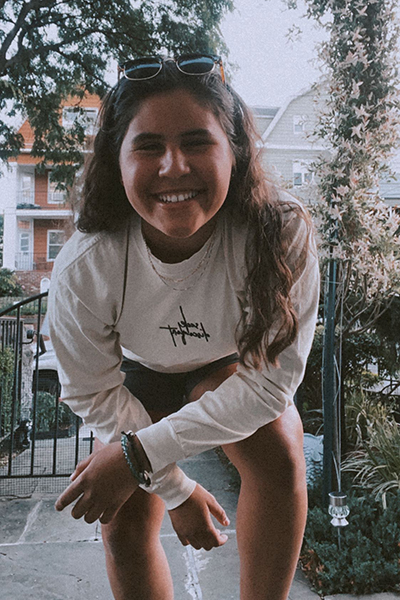
Hometown: Bronx, N.Y.
Major: Inclusive Childhood Education
Faculty mentor: Anne Burns Thomas, professor, Foundations and Social Advocacy Department
Fellowship donor: Michael J. O'Reilly ’58, M ’63
Project title: Unpacking the Monolith: Understanding Latinx Teachers’ Motivations and Career Paths
More about my research: “In the U.S., there is an extreme imbalance between the steady amount of Latinx students going into school and Latinx teachers. My project is aimed at learning and understanding the motivations of teachers from Latin backgrounds and how cultural identity shapes that motivation. We hope to get a glimpse and learn directly from the unique perspectives of the small, yet extremely diverse percentage of educators in an attempt to shed light on the ways that Latinx teachers’ motivations and obstacles impact teacher diversity efforts.”
Future aspirations: “I am looking to work in an urban, high need school district in the future. I hope to grow and experience being teacher in its entirety with students from all backgrounds and help those students who fall through the cracks of the education system. My interests lie everywhere including outside education, so while I aim to get my master’s in something education-related, I also want to continue school and explore my other interests like cultural astronomy and anthropology.”
Maria Klara Ventura
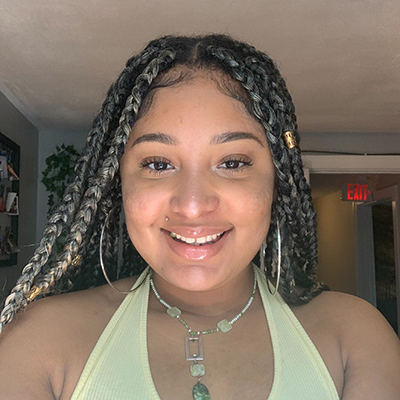
Hometown: Alameda, Calif.
Majors: International Studies and Anthropology
Faculty mentor: Flavia Dantas, associate professor, Economics Department
Fellowship donor: Nancy A. Johnson ’48
Project title: Ethno-Racial Impact of the Different Public Policy Strategies in Brazil: 2002-2020
More about my research: “My research focuses on how Brazilian governments have managed to create public policies and how each government have accomplished their goals by showing statistics. The research focuses on two areas. The first one is poverty — how did public policies helped decrease the poverty gap — and the second being racial inequality — how public policies decreased the racial gap.”
Future aspirations: “I plan to get my Ph.D. in anthropology. My goal is to go back to Brazil and try to understand a little more about some of the issues we have in the Brazilian society.”